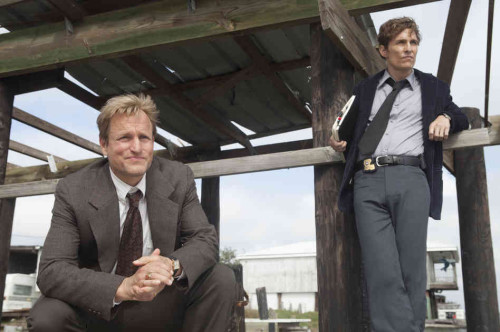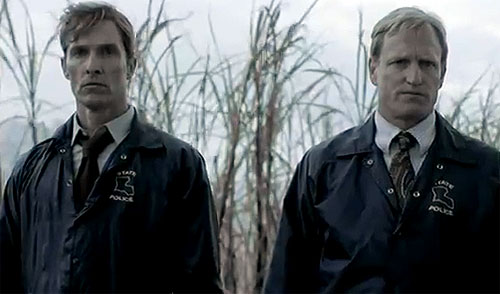DARKNESS. Conventional wisdom tells us it’s bad—something to be feared and avoided, maybe even hated and destroyed. Confounding, blinding, shrouding, hiding darkness, we’re told, consumes and tricks, ravages and damns. It’s smart, that darkness, always slinking around, waiting for us to let our guards down, hoping for its chance to strand us without a compass in some witchy woods or drunk and friendless in a fleabag motel. But conventional wisdom isn’t always right. Sometimes, it’s damn well wrong. Sometimes, as with HBO’s latest hit, True Detective, there’s actually wisdom in the darkness.
Weaving back and forth between the cult murder investigation on which detectives Martin Hart (Woody Harrelson) and Rust Cohle (Matt McConaughey) first partnered seventeen years earlier and a present tense in which another, similar killing has occurred, True Detective combines brooding atmospherics, poetic cinematography, and titillating subject matter (dope fiends and drunks, rednecks and hookers, Satanism and sex, sex, sex) to create a heady, visceral mix. The initial case thought to have been solved, the killer brought to justice, Hart and Cohle are now being interviewed (separately) by the police concerning everything from their working relationship to each other to the original case.
Powerful as they are, these interviews are secondary, serving largely as transitions in and out of the main (past tense) action. Filled with charged (and at times sickly funny) exchanges between Hart and Cohle, True Detective’s past is even darker than its present but it’s also where the show really shines. That’s where it’s most obvious how much deeper this is than your average police procedural, that it’s a philosophical discussion, a contrast between a nihilist in thought (Cohle) and a nihilist in action (Hart), maybe even a bit of a discussion about religion in America.
A philandering, blithely self-righteous small town cop who seems to have stepped out of Hawthorne by way of Cormac McCarthy, Harrelson’s Hart is ostensibly religious, holding to the sort of evangelical Christianity that dominates small town Louisiana. In truth, Hart leads a double life—one that includes a failing marriage to a beautiful wife (Michelle Monaghan) and a failing fling with a beautiful mistress (Alexandra Daddario). McConaughey’s Cohle on the other hand is a near monastic, a philosopher-cop whose empty apartment (a frameless bed and lone chair furnish his living room) and life-weary musings suggest someone largely checked out of reality. Which makes perfect sense as we learn the details of Cohle’s life. An alcoholic and addict, a golden boy maybe once upon a time, Cohle is a man ruined by his attempts to embrace society’s values (a dead daughter, a dead marriage, and a career as a public servant ultimately canceled by his own failings). Having left the force years earlier, Cohle’s present day persona is that of a small-time lowlife. Living even deeper in the country, working four days a week (and drinking the other three), he sports a cheesy moustache and a greasy, who-gives-a-fuck ponytail, insisting the cops get him a sixer if they want to hear his story. And we, like the cops, want to hear Cohle’s story. Because we know from the first episode that he’s much more than he seems. Hero or villain, maybe even the killer himself, we can’t be sure what he’s going to tell us but whatever it is we have to know.
In many ways True Detective is organized around Cohle’s musings, dark, little chestnuts like (regarding his daughter’s death), “The hubris it must take to yank a soul out of non existence into this meat. And to force a life into this thresher. Yeah so my daughter, she uh, she spared me the sin of being a father.” Or, concerning his general take on humanity, “I think human consciousness is a tragic misstep in evolution. We became too self-aware, nature created an aspect of nature separate from itself; we are creatures that should not exist by natural law. We are things that labor under the illusion of having a self; an accretion of sensory, experience and feeling, programmed with total assurance that we are each somebody, when in fact everybody is nobody. Maybe the honorable thing for our species to do is deny our programming, stop reproducing, walk hand in hand into extinction, one last midnight, brothers and sisters opting out of a raw deal.” And finally the one that made me think of Cohle’s philosophical soul mate, the French writer, Celine, “I don’t sleep. I dream.”
One of the greatest French novelists of the twentieth century, a writer whose work served as primer for Jean-Paul Sartre and the American Beats, Louis-Ferdinand Celine was, like Cohle, a man trapped in his own impenetrable, insomniac night. A Nazi sympathizer before World War II and a collaborator during it, Celine hated Jews ardently, apparently until the day he died. Declared a national disgrace and exiled after the war, Celine was eventually granted a pardon—unlike Americans, the French seem to have an almost pathological need to separate art and artist, to not only countenance but maybe even celebrate the fact that someone can have vile political views and still be a great auteur. A nihilist, like Rust Cohle, Celine’s masterpiece is widely regarded to be his 1932 first novel, Journey to the End of the Night. In Journey, Celine pits his misanthropic hero (and philosophical stand-in), Bardamu, against a world he despises, a world of consumption and mechanism, false hopes and ultimate failure.
A would-be war hero turned coward by World War I, Bardamu spends his post-war years in French Africa then America where he goes to work for Ford. Ultimately leaving America, Bardamu returns to France where he becomes a doctor–which he fails at, of course, like everything else. Bardamu fails because that is all he can do, failure the fundamental human condition. As Celine would have it life itself is a meaningless journey through pain and suffering, through darkness, the only relief coming when the night that is life ends.
But I’m not quite the fatalist Celine is. I say we make our own meaning out of the world and the art in it; and though that meaning may be fleeting, though it may not survive our deaths, it does belong to us. Personally, I find it difficult to watch True Detective without thinking about Celine but it’s not just for the black humor or nihilism and it’s not just, strictly speaking, for Celine. It’s because of an essay about him by William Vollmann, another point of data that goes into my personal construction of meaning.
In an afterward to the 2006 edition of Journey to the End of the Night, Vollmann writes, “Freedom fries and to hell with the French for this American war and this nightmare criminal idiot of a President we’ve got—that’s satire as hilarious as when Robinson (a character in Journey) murdered the old lady! And it all happened HERE in this big fat country whose standards of personal hygiene and optimistic self-delusion Celine almost admired…” Reading Vollmann’s piece today, it’s hard not to consider what True Detective and Celine have to say about America nearly a decade later.
America loves its religion, the Christianity that some would see installed as a sort of national religion. Conversely, it hates atheism and agnosticism, strains of thought that fit quite comfortably with nihilism. Go on, ask the woman on the street, in small town Louisiana to explain the difference between atheism and agnosticism or either one and Satanism. She’ll probably stare at you eyes agape, arms akimbo, waiting for your next question. Or maybe she’ll point to a billboard for True Detective, McConnaughy’s chiseled features glaring heroically (or is it evilly?) down. Is he going to catch the Satanists or atheists or whatever they are? Is he one of the Satanists or atheists or whatever they are? She doesn’t know. She doesn’t care. As long as it’s a good yarn—and True Detective is—she’ll go for it. So will I. And so will you.
Had you asked that same woman to explain the difference between a Muslim and a Sikh a decade earlier, post-9/11, she probably wouldn’t have been able to do that either. Or maybe she’d have pointed to a USMC recruitment billboard—the face of a corporal in his dress uni superimposed over a massive American flag, beneath it all a sea of golden sand.
We need villains in America, and we love them to be foreigners—not necessarily in nationality but in thought like Rust Cohle. He is, as Hart describes him, so “aloof,” so “smart” and “edgy.” Hell, he almost sounds French. Hart says to him, “You’re Christian, yeah?” Cohle’s response is a derisive, drawly, “No.” In some ways this lack of religion, this defiance of Christianity, makes Cohle the perfect villain in America. Like Sartre on a fistful of Quaaludes, he tells Hart (and us) everything we have wrong not just as people, but also as Americans. We put too much stock in the past, its supposed historicity and accepted icons, the received greatness of our yesterdays. We put too much stock in trying to find a sole specific meaning in our existence, in thinking that we have it in Jesus, Christianity, or even America, the idea that there is some truth standing above all others. But like most philosophers, Cohle’s answers aren’t really answers. They’re questions in disguise, the final one being whether or not he’s the killer, a question I expect will only be answered when True Detective’s eighth and final episode hits TV some time in March. That answer, and the way it’s received, will tell us a lot about America, and where it stands on religion, or the lack thereof.
For now, maybe Vollmann sums it up best, for Celine and Bardamu, for Rust Cohle and the rest of us: “Our hero still stands, let’s say, in the dusk.” And we stand with him, watching, waiting, wondering what else True Detective and Rust Cohle will tell us about America and ourselves.





Pingback: Journey to the end of the American Night | the APOCALYPTIC SINGALONG
Pingback: True Detective: Journey to the End of the American Night | the APOCALYPTIC SINGALONG